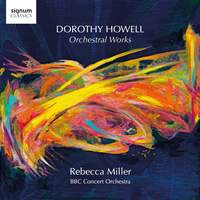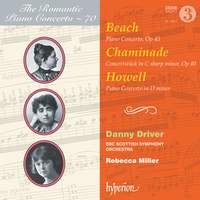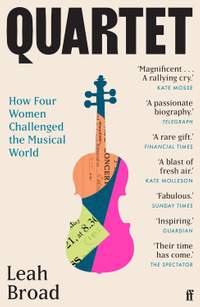Interview,
Rebecca Miller on Dorothy Howell
Having enjoyed the results enormously, I spoke to Rebecca last month about how her mission to unearth more of Howell's scores led to a friendship with the composer's niece and nephew, the role which Sir Henry Wood played in championing Howell's works, and how the 'humour, character and integrity' of the music leapt off the page to her...
How did Dorothy Howell come onto your radar?
Entirely by accident – we were planning a disc of concertos by women composers with Hyperion, and the pianist happened to be my husband [Danny Driver]. We were supposed to record Helen Hopekirk’s concerto, but the Hopekirk Foundation withdrew their rights at short notice so we had to find a replacement. Dorothy Howell’s piece was suggested to us by Mike Spring, who had compiled an amazing database of repertoire for Hyperion’s Romantic Piano Concerto series; his one caveat was that we had to go and meet her niece and nephew in person, because they wanted to get to know the people who were going to record her music.
So off we went to this old crumbling Victorian house in Bewdley to meet Merryn and Columb Howell. We were just amazed at them, and the stories they told us about ‘Auntie D’: growing up, visiting in the holidays and listening to Dorothy playing. Later in life they were involved in her move to Malvern, and maintained a close relationship until the year she died. Merryn was the one who saved all of her music, cataloguing everything by hand in her distinctive tiny writing!
When they presented us with the score of the Piano Concerto we were really convinced about the piece, and Merryn and Columb were very happy for us to go ahead. There was quite a lot of work to be done in terms of getting parts ready, because it hadn’t been published; the BBC typeset it, but there wasn’t a two-piano version so Danny struggled to work from a manuscript!
We recorded it with the BBC Scottish Symphony Orchestra, and Merryn and Columb came up for the last day of sessions: they were over the moon, and so were we! I’ve been a champion of the piece ever since and Danny recently performed it in Finland, but it doesn’t seem to have caught on yet...I wish more people would take it up and learn it, because it just fits perfectly onto a concert-programme – it’s one-movement fantasy, so it’s not too long!
When did you discover the four pieces which receive their first recordings on the album?
I was so impressed with the concerto that I went back to the Howells and asked if there was more orchestral music we could explore. I spent an afternoon going through Merryn’s dusty old brown envelopes, and these four pieces just jumped off the page to me. In 2018 we had a Dorothy Howell study day with the South Bank Sinfonia at St John’s Waterloo, generously funded by the Sirens Fund; we played through everything that eventually ended up on the album aside from Lamia, and some of these pieces hadn’t been heard in fifty years. The people who were there loved it and encouraged us to record the music so that it could be heard more widely.
Things were inevitably delayed by the lockdowns, but in the summer of 2022 the recording-sessions finally happened. Merryn and Columb again came along to the last day, and they were completely overwhelmed. They represent for me what the music says on the page: they’re strong characters with real humour and integrity, and I was so delighted to be able to make this happen at last.
The music on the album spans three decades: how much did Howell's style evolve after the early success of Lamia?
Her style certainly changed – I don’t know if I would use the word ‘evolved’, because Lamia is a wonderfully structured piece in and of itself, but I do think that she developed more of an individual recognisable voice in those later pieces. In the Humoresque, the Divertissements and The Rock in particular, she embraces a more distinctive rhythmic style as well as a sense of humour and character: I find a lot of humour in all of her music, but it’s especially strong in her later pieces. That also comes across in her letters and diaries, and it cropped up a lot in the conversations we had with Merryn and Columb: they told us that she always put a smile on people’s faces!
Howell was just 21 when Lamia brought her to international attention – how did she respond to being thrust into the public eye?
I get the sense that she was fairly level-headed. Leah Broad explores this in much more depth in her wonderful book Quartet, but my impression is that she really enjoyed the success she was having whilst remaining quite humble about it: when she was approached for interviews she’d tell people ‘I’ll say a few words then excuse myself to go deal with my trumpets and trombones!’ Her correspondence about the premiere certainly indicates that she wasn’t expecting the amount of applause and attention that came with it: there are stories about the paparazzi following her home afterwards! She didn’t respond to them and was exhausted by the whole thing.
Lamia was published and she got paid for it as well, which was quite something – not even Elgar had that for his first composition. It definitely put her on the map, and she always looked back on that as an amazing success which made her career.
What's the story behind her relationship with Henry Wood, who conducted the premiere of Lamia at the Proms?
It came about when Dorothy was studying composition with John McEwen at the Academy, and it was McEwen who brought Lamia to the attention of Henry Wood. Wood then invited her to a meeting because he’d been so impressed with the score; he went on to programme a lot of her works and commissioned Divertissement. He also asked her to give him exclusivity to Lamia, which must’ve been a difficult question for Dorothy as she was already fielding requests from conductors who wanted to programme the work internationally. For better or worse, she said yes to Wood, and it’s possible that her decision may have limited the reach of the piece – one never knows, because it’s one of those Sliding Doors situations!
That decision says a lot about her character, I think: Dorothy was a very loyal person, both in terms of family and people who had given her opportunities. I don’t think she ever sought out fame. She knew from a very young age that she wanted to be a musician, but she didn’t really self-promote: she wasn’t like Ethel Smyth, knocking on doors until they burst open!
Henry Wood tried to get her to join his conducting class at the Academy, and McEwen endorsed that suggestion. She and McEwen had a close friendship for many years; they would have dinners and do concerts together, and Dorothy performed a lot of his music. He was a great supporter, and put her name forward on various occasions. She declined the conducting place at the Academy, although Ethel Smyth was strongly in favour of it: she encouraged Dorothy to diversify her career as much as possible rather than putting all her eggs in one basket! But Dorothy had no desire to be in the limelight: she wanted her music to be at the centre of things, not herself.
Was Ethel Smyth an important person in Howell's life, despite their very different personalities?
Ethel was a great supporter, and there’s a lot of correspondence between the two of them: we know that she came along to the rehearsals of Koong-Shee on the grounds that she was a ‘slow listener’ who needed to hear things more than once! She was obviously somebody that Dorothy looked up to and asked for advice, and oftentimes Ethel would write back saying ‘What’s going on in the music business is rubbish, and I can’t offer you advice - all I can offer you is a sympathetic ear!’
When things turned serialistic and very intellectual, composers of beautiful tonal music were relegated to the bottom drawer and dismissed as being irrelevant and old-fashioned. There was a lot of correspondence between her and Smyth about the direction of travel – even straight out of the Academy, Dorothy felt like she was a relic already.
Howell was sometimes referred to as 'The English Strauss', which strikes me as a slightly odd sobriquet...do you hear any parallels between the two composers?
I’m a bit baffled by that as well: I’ve thought about it for many years, and I don’t see any relationship other than the fact that they both wrote tone-poems! It’s superficial labelling, but I do wonder whether it was partly to do with the tensions that were present between England and Germany at the time, with the English press saying ‘We’ve got this young prodigy composer of our own, and we don’t need your German music!’
I think Howell was most comfortable in the land of tone-poems or character music. All of the pieces I’ve recorded are about storytelling in some regard; even the Piano Concerto is a fantasy rather than a concerto in any formal sense.
What else did you discover in the Howell archives? Is there enough material for a second volume of orchestral works?
There are three pieces for voice and orchestra, two of which were commissioned straight after Lamia – A South-wester and A Sunset, both from 1919. Then there’s a handful of shorter orchestral works: the Two Pieces for Muted Strings from 1926, the Minuet for Strings from 1923, the Two Dances from 1920, and the Westminster Fanfare from 1930…so there might be enough for another album, actually!
I’m also very interested in going back to Bewdley and looking at the sacred music, because she turned more towards that in her later years; she was a devout Catholic all her life, and there’s a lot of choral music from the 1960s and 70s. I don’t know if any of those have orchestral accompaniments, but that could be one idea for an album…
Are there any plans afoot for the orchestral scores to be published?
I have been pushing that for about a year and I do have some bites, but I can’t say any more just yet...The scores I picked up and worked from actually have Henry Wood’s blue pencil-markings, and I think it would be wonderful to preserve that. Howell really needs to be put on the map, and nobody’s going to perform the music if the parts are sitting under my desk!
BBC Concert Orchestra, Rebecca Miller
Available Formats: CD, MP3, FLAC, Hi-Res FLAC
Danny Driver (piano), BBC Scottish Symphony Orchestra, Rebecca Miller
Available Formats: CD, MP3, FLAC, Hi-Res FLAC
Leah Broad
Available Format: Book






